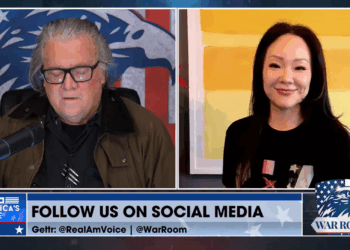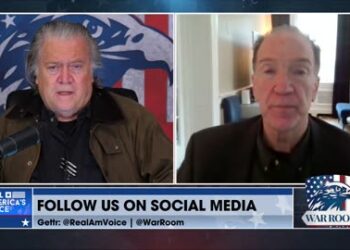In a Tuesday WarRoom discussion, Donald Trump Jr. and economic advisor Scott Bessent dissected the state of the U.S. economy, highlighting the challenges most Americans face and offering a vision for the future. This conversation highlighted the crucial role of economic policy in the upcoming presidential election, painting a stark picture of the current economic divide under the Biden administration and the years under President Trump.
“A big part of this election is going to be the economy,” he stated, pointing to Bill Clinton’s well-known phrase, “It’s the economy, stupid.” This sentiment set the stage for a detailed analysis of America’s economic woes.
Scott Bessent described the current state as a “tale of two economies.” He explained, “70 percent of Americans are in a recession,” despite official metrics suggesting otherwise. According to Bessent, this bifurcation is due to the disproportionate consumption by the top 10-20 percent of earners, leaving the bottom 50 percent struggling. He likened the Biden administration’s approach to central planning, paralleling China’s economic model.
“The upper 10, 20 percent of America consume so much,” Bessent noted. “The bottom 50 are getting crushed.” This disparity is evident in the stock market, where a few high-performing stocks skew perceptions of overall economic health. “If you’re not a holder of those [top stocks], it’s not really the economic marker that people think it is,” Bessent explained.
The discussion moved to the impact of rising interest rates on everyday Americans. Bessent highlighted alarming statistics: “Auto repossessions are up 23 percent,” and “43 percent of small businesses weren’t able to pay rent that month.” These figures reflect the broader economic strain felt by the working class, exacerbated by the administration’s policies.
Drawing a contrast with the Trump administration, Bessent remarked, “In Trump 1.0, working-class people did great. Manual workers’ salaries went up two times the managerial class.” He argued that the current administration’s policies favor asset holders while burdening those with debt. “In Joe Biden’s America, you either own assets, or you’re in the bottom 50 percent, and you have debt and you’re getting crushed.”
Bessent and Trump Jr. agreed on the need for a fundamental shift in economic policy. Bessent proposed, “The first few months of a Trump 2.0 would be to reprivatize the economy,” emphasizing deregulation, reducing the budget deficit, and achieving energy dominance. He stressed, “The only way to solve these problems is through growth.”
The conversation also touched on the implications of massive national debt. Bessent warned, “For the first time, interest costs on the national debt are bigger than the defense budget,” making debt a national security issue. He criticized the administration’s fiscal policies, noting, “They’re just putting debt on top of debt and trying to make us into a European-style social democracy.”
Trump Jr. highlighted the urgency of addressing these issues for future generations. “How does anyone afford a home? How does a young person coming out of college start?” he asked. Bessent echoed this concern, attributing Trump’s popularity among younger voters to their diminishing hope in the American Dream. “They’re losing hope in the American Dream,” he said.
This discussion between Trump Jr. and Bessent underscored the critical intersection of economic policy and political strategy, illustrating the dire need for a comprehensive plan to address the economic divide and restore prosperity for all Americans.
For more context, watch the entire WarRoom segment with Bessent and Trump Jr.:





